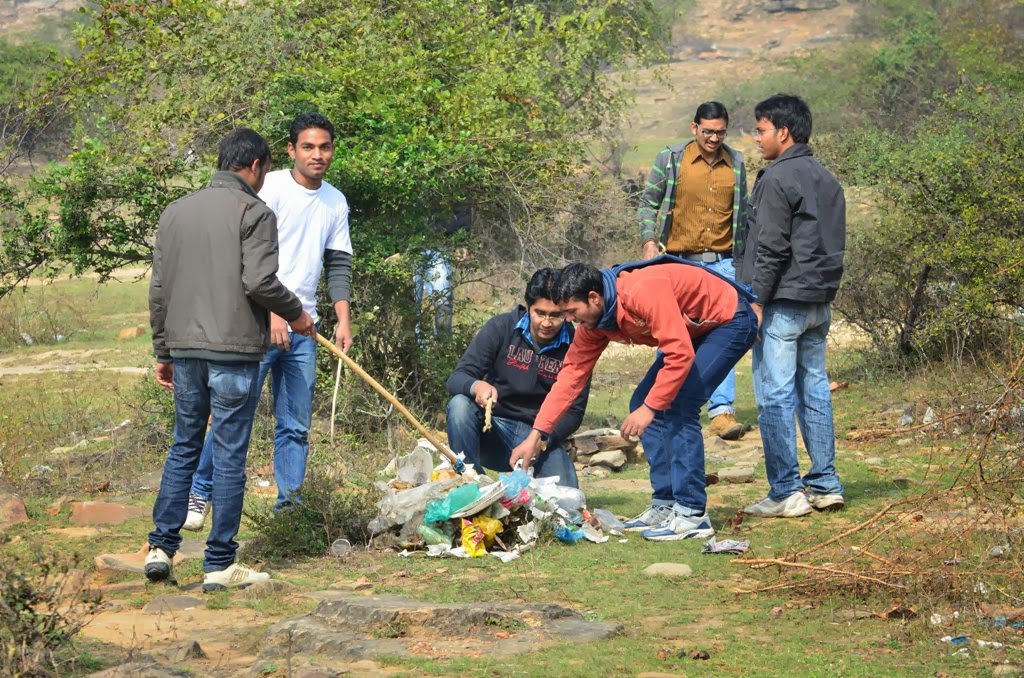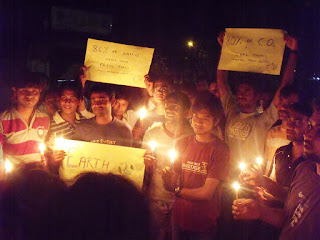After the open discussions were over, the next step was to bring the suggestions into administrative policy. In continuation of the process, Eco One organized a round table meeting on 9th April, 2012. Representative of students, faculty, administration and shop owners were invited in the meeting to plan out the firm base for the Zero Waste Policy. The members who participated in the round table meeting are
1. Prof. Guru Prasad Singh, Member Core Group, RGSC (Mentor, Eco One)
2. Prof. S.K. Swain, Student Advisor, RGSC
3. Dr. Ashish Singh, Hostel Coordinator, RGSC (Moderator, Eco One)
4. Dr. Somu Singh, Admin. Warden, Shivalik Hostel, RGSC and Coordinator, NSS (Moderator, Eco One)
5. Dr. Ajay Singh, Admin. Warden, Vindhyachal Hostel, RGSC and Coordinator, NSS (Moderator, Eco One)
6. Dr. Vinod Singh, Admin. Warden, New Boys Hostel, RGSC and Coordinator, NSS (Moderator, Eco One)
7. Mr. Vijai Krishna, Warden Shivalik hostel, RGSC
8. Mr. Ankit Seth, Warden, Shivalik Hostel
9. Mr. Kaustav Chatterjee, Warden, Vindhyachal Hostel
10. Dr. Anil K. Pandey, Asst. Professor, Centre for Environment Science and Technology, RGSC
11. Dr. Drigwendu Mani Singh, Assistant Professor, MBA Agribusiness
12. Dr. Irfan Ahmed Khan, Assistant Professor, MBA Agribusiness
13. Dr. D.N. Gautam, Assistant Professor, Ayurveda
14. Mr. Naveen Kumar, Assistant Professor, Journalism and Mass Comm., RGSC
15. Ms. Sadhana Srivastava, Assistant Professor, Journalism and Mass Comm., RGSC
16. Mr. Krishnakant Dwiwedi, Owner, Shop no. 2 (General Store), RGSC
17. Mr. Manoj, Owner, Shop no. 1 (Tea joint), RGSC
18. Mr. Dwiwedi, Owner of roadside tea stall, RGSC
19. Mr. Debadityo Sinha, M.Sc.(Tech.) Environmental Science & Technology (Head, Eco One Management Council)
20. Dandapani Varsha, M.Sc.(Tech.) Environmental Science & Technology (Eco One Hostel Ambassador, Vindhyavasini Girls Hostel)
21. Jaydev Kumar, M.Sc.(Tech.) Environmental Science & Technology (Eco One Hostel Ambassador, Shivalik Hostel)
22. Pankaj Kumar Gupta, M.Sc.(Tech.) Environmental Science & Technology (Eco One Hostel Ambassador, Vindhyachal Hostel)
23. Shishir Kumar, M.Sc.(Tech.) Environmental Science & Technology (Eco One Hostel Ambassador, Vindhyachal Hostel)
24. Ashok Yadav, M.Sc.(Tech.) Environmental Science & Technology (Member, Eco One Management Council)
25. Vikas Yadav, M.Sc.(Tech.) Environmental Science & Technology (Member, Eco One Management Council)
26. Pratima Gupta, M.Sc.(Tech.) Environmental Science & Technology (Member, Eco One Management Council)
27. Shachi Rai, M.Sc. (Ag) Soil and Water Conservation (Member, Eco One Management Council)
 It was a first meeting of its kind in which faculty members, student & shopkeepers participated to give their suggestions on making our campus free of waste and common consensus was reached as discussed in next paragraphs.
It was a first meeting of its kind in which faculty members, student & shopkeepers participated to give their suggestions on making our campus free of waste and common consensus was reached as discussed in next paragraphs.The common consensus was that dustbins should be installed at every 100 meter.
A common dustbin should be made in front of every building and hostel.The dustbin should be divided into two parts one for biodegradable and other for non biodegradable.
Prof. G P Singh said that we should select a place for the disposal of the waste, for this he suggested a site low lying area near Jatropha plantation just behind the Guest House. He suggested arrangement of one hydraulic tractor which will collect the garbage from every hostels and building and dispose it to the disposal site.
During the meeting it was also said that until the permanent dustbins are made, the empty drums of coal tar to be availed from UWD which shall be cut and placed at different places in the campus.
Prof. G.P. Singh suggested that shopkeepers should use ‘kulhad’ in place of plastic cups or glasses. To solve the problem of polythene bags for grocery items it was mutually decided and requested to the owner of shop no. 2 Mr. Krishnakant that items less than 500 g to be given in thongas and not provide polythene for prepacked materials. Mr. Krishnakant agreed to restrict the use of polythene bags only for food grains. Mr. Manoj, who own shop no. 1 agreed the proposal and he assured that he will provide tea in kulhad only.
It was recommended that banning of polythene at a sudden is not possible and the emphasis was given on gradual phase out of polythene by bringing behavioural change. It was suggested that items less than 500 g to be given in thongas and not provide polythene for prepacked materials. Mr. Krishnakant agreed to restrict the use of polythene bags only for food grains. Mr. Manoj, who own shop no. 1 agreed the proposal and he assured that he will provide tea in kulhad only.
 Dr. Somu Singh supported the concept of ‘Common Cart Bags’. Few speakers showed concerns over the success of those bags as the bags will be vulnerable to theft. Debadityo Sinha suggested that from the next session during the allotment of hostel the students shall be provided a cloth bag at minimal cost by the administration which will be use by students for shopping purpose. Under incidence of lost, he/she can again buy a new one by paying the cost from hostel wardens.
Dr. Somu Singh supported the concept of ‘Common Cart Bags’. Few speakers showed concerns over the success of those bags as the bags will be vulnerable to theft. Debadityo Sinha suggested that from the next session during the allotment of hostel the students shall be provided a cloth bag at minimal cost by the administration which will be use by students for shopping purpose. Under incidence of lost, he/she can again buy a new one by paying the cost from hostel wardens.
DProf. G P Singh suggested the Admin Wardens to write a proposal for the construction of compost pits behind the hostels.
 It was said that source of paper waste is mainly from office and assignments. The owner of shop no. 2 Krishnkant Dwivedi said that he sells about 5000 plastic files in a year and about 70000 – 100000 papers are used by students in a year. For this the common consensus was that the internal assignments should be taken in soft copy by the faculty. If the hard copy is needed then the font should be small and the print should be on both sides. The waste papers in the office shall be collected at one place and used for other purposes like rough work and printing notices. Dr. Irfan Ahmed Khan suggested that the one sided used paper shall be used to make note pads by taking help of self help groups in neighboring villages. He informed that he encourages the students to give their assignments in soft form. A common consensus was reached that the assignments and reports for internal assessments be taken in soft copy and hard copy be discouraged by every course.
It was said that source of paper waste is mainly from office and assignments. The owner of shop no. 2 Krishnkant Dwivedi said that he sells about 5000 plastic files in a year and about 70000 – 100000 papers are used by students in a year. For this the common consensus was that the internal assignments should be taken in soft copy by the faculty. If the hard copy is needed then the font should be small and the print should be on both sides. The waste papers in the office shall be collected at one place and used for other purposes like rough work and printing notices. Dr. Irfan Ahmed Khan suggested that the one sided used paper shall be used to make note pads by taking help of self help groups in neighboring villages. He informed that he encourages the students to give their assignments in soft form. A common consensus was reached that the assignments and reports for internal assessments be taken in soft copy and hard copy be discouraged by every course. Dr. Anil Pandey informed that the capacities of the soak pits installed in the hostels are not defined. He suggested that absorbing capacity of soak pits be redefined and required additional measures shall be taken to stop overflow of sewage water from soak pits. The common consensus was that the capacity of the pits should be increased. Dr. Anil Pandey said that about 150 liters of water is used by one person in a day. The waste water of bathrooms are discharged in open for this the common consensus was that a temporary storage tank at first floor can act as zero-energy watering system for the gardens in hostel where watering will be done by gravitational energy. Prof. G P Singh suggested the Admin Warden to write about the proposal soon. Dr. Anil Pandey and Dr. Drigwendu Mani Singh suggested that the water shall be temporarily stored which can be used for gardening purposes cause that waste water contain phosphorus in large amount. Debadityo Sinha suggested that the diameter of the taps shall be reduced to conserve water as well as reduce waste water. Press taps can do well.
Dr. Anil Pandey informed that the capacities of the soak pits installed in the hostels are not defined. He suggested that absorbing capacity of soak pits be redefined and required additional measures shall be taken to stop overflow of sewage water from soak pits. The common consensus was that the capacity of the pits should be increased. Dr. Anil Pandey said that about 150 liters of water is used by one person in a day. The waste water of bathrooms are discharged in open for this the common consensus was that a temporary storage tank at first floor can act as zero-energy watering system for the gardens in hostel where watering will be done by gravitational energy. Prof. G P Singh suggested the Admin Warden to write about the proposal soon. Dr. Anil Pandey and Dr. Drigwendu Mani Singh suggested that the water shall be temporarily stored which can be used for gardening purposes cause that waste water contain phosphorus in large amount. Debadityo Sinha suggested that the diameter of the taps shall be reduced to conserve water as well as reduce waste water. Press taps can do well. The capacity of toilet flushes can be reduced by placing empty bottles which will lead to reduction in sewage generation. Residential students shall be made aware about need to conserve water.
The common consensus was that community participation programs and campaigns like cleanliness drives, competetions etc to be organized at regular intervals to spread awareness and sensitization of mass. The steps towards restriction of polybags be taken in initial time of each sessions.
It can be said that the meeting was fruitful and some concrete suggestion came out and a common consensus was reached over the improvement of waste management in campus. The suggestions from the open discussions were discusses and improved in the presence of the stakeholders.




























+by+Eco+One+(11).JPG)

